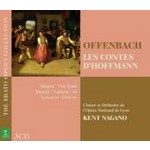
Offenbach: Les Contes d'Hoffman (The Tales of Hoffman) (complete opera)
 $45.00
Out of Stock
$45.00
Out of Stockadd to cart
JACQUES OFFENBACH
Offenbach: Les Contes d'Hoffman (The Tales of Hoffman) (complete opera)
Roberto Alagna, Jose van Dam, Natalie Dessay, Sumi Jo / l'Opera National de Lyon, Kent Nagano
[ Erato / Warner Classics The Opera Collection / 3 CD ]
Release Date: Monday 25 July 2011
This item is currently unavailable via the quick and easy sources, but we’ll make enquiries for you. Please note - listed price is indicative only.
"With Nagano taking a light, airy view and using the most scholarly text available, this new version certainly has its place." (Gramophone)
"Since Offenbach wrote so much material for his first and last grand opera, Les contes d'Hoffmann, and then died before he could sort it out, textual problems are insoluble. This new one from Erato uses the authoritative edition prepared by Michael Kaye, which exploits not only the extra 1,250 autograph pages available to Fritz Oeser when he prepared his edition (as used by Cambreling), but 350 more manuscript pages in addition. It is good to have the Kaye edition on record again, this time with the Guiraud recitatives used rather than spoken dialogue. The lengthy essay by Kaye is very valuable indeed, giving a detailed account of the background to the composition of the opera, as well as explaining in depth his approach in preparing the material for his edition. It is a measure of the complexity of the problems, that as Kaye points out, Offenbach often wrote multiple versions of particular numbers - two versions of Dapertutto's chanson, three of the appearance of the Muse, two different songs for Olympia and three differing settings of Giulietta's seduction aria. I certainly would not quarrel with Kaye's judgement as a rule, but in a recording it does seem to me a pity that the spurious but delightful "Scintille, diamant" for Dapertutto is not included even as an appendix, as it was with Cambreling. By contrast, Nagano includes the other favourite number proved to be spurious, the sextet in the Giulietta scene, and a note explains that if you want, you can programme it out on the CD. Characteristically, Nagano takes it at a speed far faster than usual, making it trip along like an operetta number, accelerating even faster towards the end. I turned with relief to the Bonynge version, which - most effectively, if with little scholarly justification - uses that number as a quartet in the epilogue. At a far broader speed Bonynge gives it a most satisfying thrust, providing a fine climax to the opera, however unauthentic it may be. Nagano, like Cambreling and Tate, provides musical weight in that epilogue (in Kaye's edition called Act 5) with the hymn-like solo and ensemble led by the Muse, "Des cendres de ton coeur", though this time Stella adds a second verse with a totally different message, bidding farewell, before the final ensemble.
Quite apart from the use of recitatives, Nagano's approach is strikingly different from Tate's, with brisk speeds the rule and a recording acoustic and balance that give a sharpness of focus to the sound very apt for the music. That means that, despite the use of recitatives, Nagano makes the piece sound much less like a grand opera than any of his rivals, much closer in spirit to Offenbach's operettas - rather ironic when you see that "grand opera" claim on the box. Not only do Nagano's fast speeds and jaunty rhythms play their part in that impression, so does the recording quality, with the orchestral writing given extra transparency.
Sumi Jo is as ever a charmer: one simply has to register Giulietta as a different character from usual. Natalie Dessay, the Olympia, and Leontina Vaduva, the Antonia, are both young singers who have begun to make their mark on disc.
With Nagano taking a light, airy view and using the most scholarly text available, this new version certainly has its place." (Gramophone)

